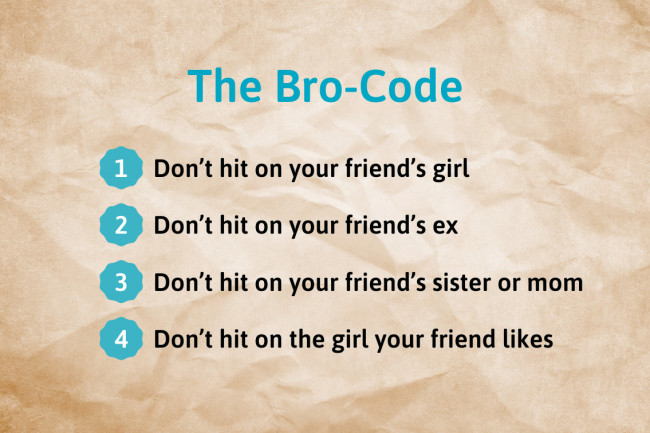Social circles have been shrinking in America since the 90s’, and most Americans have three or fewer close friends today.[1] The decline in close friendships has been even worse in men. Men also report feeling more lonely than women.[2] This is a concern since men need close friendships, too. Friendships promote mental and physical wellbeing[3] and enhance life satisfaction.[4]
In this article, we’ll first look at some of the reasons for the decline in male-to-male friendships. Part of this will include examining what makes male friendship difficult. Next, we’ll discover what it means to have real male friendship—which resembles brotherhood—versus toxic male friendship. Finally, we’ll answer the question of whether men do, indeed, need male friendships.
Sections
- Why do men lack close male friendships?
- 6 signs of true male friendship
- 8 signs of toxic male friendship
- Why men need meaningful friendships with other men
- Common questions
Why do men lack close male friendships?
Male friendships do not seem to be valued as much as female friendships. Not only do men have fewer close friends than women,[1] but their friendships also tend to be less intimate.[5]
Below are 5 reasons why men struggle to build intimate friendships:
1. Traditional masculine ideals
Masculinity has, for a long time, been associated with qualities like emotional indifference, competitiveness, independence, dominance, and aggression.[6] Research has shown that men who internalize these traditional constructs of masculinity may suffer as a result.[7]
As it relates to friendship, men who adopt traditional masculine values find it hard to be vulnerable, even with friends.[6] But vulnerability is required to develop a close bond.[8] Men often choose to keep their innermost feelings to themselves, and this creates a vicious cycle. Because they don’t open up, nor see other adult males opening up, men may assume something is wrong with them when they are overcome with emotion. The fear of exposing themselves emotionally and appearing weak means that some men may miss out on opportunities to connect with their friends on a deeper level.
2. Men’s friendships operate side by side
According to researchers, male bonding happens side by side, and female bonding happens face to face.[9] In other words, men bond by engaging in shared interests, such as playing sports or video games together—things that can be done “shoulder to shoulder.”

On the other hand, women bond through talking and sharing secrets with one another. Men’s preference for bonding in a way that requires less vulnerability means that their friendships may not become as emotionally close as women’s friendships.
You might find some interesting ideas in this list of things to do with friends.
3. Homohysteria
As a society, we have seen remarkable progress concerning the acceptance of different sexual orientations. It wasn’t always this way: in the early 20th century, homophobia was very much alive.[10] People became more aware of homosexuality, and the influential psychologist, Sigmund Freud, published papers on sexuality. He blamed the “rise” in homosexuality on men being brought up as feminine and lacking male role models. In doing so, he inadvertently created a fear of homosexuality.[10]
Homosexuality was eventually policed, and homohysteria—the fear of being labeled as gay—broke out.[10] Researchers have argued that this influenced the dynamic of male friendships.[11] Men learned to avoid and even fear becoming too physically or emotionally close. While society has moved on, for some men, this mentality may still be deeply ingrained.
4. Male competition
When it comes to same-sex friendships, men’s friendships are marked by more competition and less intimacy compared to women’s.[12] As the more competitive sex,[13][14] men compete with one another in multiple domains—especially female attention, financial success, and athletics.[11]
It has been argued that men are less satisfied with their same-sex friendships because of the latent competition between them.[15] Competition between two adult males becomes unhealthy when one of them has a desire to dominate and win at all costs.[15][16] In male friendships marked by this kind of competition, the friendship may become compromised.
6 signs of true male friendship
True guy friends are quite easy to spot. You just need to consider the way they treat you and the kind of relationship you have with them. If they regularly do things to show that they care about you and support you—and if the relationship has few (if any!) problems—then that’s a solid sign of true male friendship.
1. You can talk to them
As a man, having a guy friend with whom you can be open when you’re going through a rough time is a pretty big deal. Men have been conditioned not to show any weakness, and we know that men don’t typically bond over talking and sharing their feelings.[8]
There’d need to be a huge amount of trust in a friendship for a man to feel comfortable enough with that level of vulnerability. So, if you have a male friend who you’d feel comfortable calling in a crisis, you can consider him a true friend.
2. You can trust them
In true male friendship, friends have integrity. They are brutally honest with one another when situations call for it, and their honesty always comes from a place of wanting the best for one another. A true friend will call you out if they think you’re making a bad decision or behaving poorly.
Say you were entertaining the idea of cheating on your partner following a heated argument and a few drinks at the club. A true friend would warn you of the repercussions and try to talk you out of it. They’d care about how your decision would affect you the next morning.
3. You don’t need to remind them of the bro-code
Almost every man out there has heard about the bro-code in some shape or form—those unspoken yet widely understood rules that govern true male friendship. Arguably the most important one is that bros (male friends) take priority over women, especially when it comes to dating.
If your friend has always followed these bro-code rules and you’ve never needed to remind him of them, then he’s a true friend:

4. You have one another’s backs
Research has found that when men directly insult one another, it is a way of showing affection without compromising their masculinity.[17] If this is true, then it means that roasting should only happen in private. True male friends should always stand up for one another in the company of others and should never talk badly about one another in public. A friend who teases you in private but always has your back when you’re not around is a true friend.
5. You don’t compete with one another
Sometimes a little competition between two friends can be healthy if it motivates one or the other to reach their goals. Here’s an example: say you and a friend have both been trying to get ripped for summer. Your friend has been hitting all of his workout goals, and you’ve been falling short of yours. Your friend’s progress can help motivate you to do better.
Hypercompetitiveness—always needing to compete and always needing to win—has been linked with greater conflict and greater dissatisfaction in peer relationships.[15] It’s draining being friends with someone who is always trying to outdo you and who can never just be happy for you. True friends support one another’s personal wins without jealousy and without the need to be better.
6. You can rely on them
In a true male friendship, you know that in your darkest hour, your friend will be there for you. Whether your car breaks down in the middle of the night and you need help getting home; whether you lose your job and need a place to crash; or whether you get dumped and need a drinking buddy—no matter what—you know you can always count on a true friend.
8 signs of toxic male friendship
Male friendship usually becomes toxic when it turns competitive and becomes a case of who can be the better man. When one friend is very self-centered, male friendships also suffer. A relationship that is seriously imbalanced cannot thrive. Here are some warning signs of toxic male friendship.
1. You’re only useful when they need something
A toxic friendship can often feel very one-sided. If your friend’s needs always come first, you may be dealing with a toxic friend. In healthy friendships, both friends give and take fairly evenly, but in toxic friendships, it’s all about one person.
Here are some warnings signs that may indicate your friendship is one-sided:
- Conversations always center around their problems. They rarely ask about you.
- When they call, it’s to ask for a favor disguised as an opportunity to hang out. Maybe they want you to join them at a party, but only because you have a car and can lift them.
- They never offer to return any favors. If you directly ask for one, they find an excuse not to do it.
2. Your self-esteem is always under attack
Good-natured teasing between friends can be a way of showing affection,[18] but there’s a fine line between teasing and bullying.[19] For teasing to be received well, the friendship has to be close, the person being teased must not take offense, and the intention behind the teasing should be non-threatening.[19][20] Teasing that is threatening targets a person’s insecurities and breaks down their self-esteem.
For example, say you had a mole on your face that you were self-conscious about. If your friend made fun of it, their intent would be threatening. Why? Because if they knew it was something you were insecure about, they would also know that making a joke about it would make you feel bad about yourself.
3. You’re always being one-upped
If you told a friend some positive news, you’d expect them to be happy for you, and a true friend would be. Toxic friends, on the other hand, may find it very difficult to be happy for you. Instead, what you might notice is an air of rivalry—a need to present themselves as superior to you.[21]
Did you tell them you get up at 7 am to hit the gym? Well, they get up at 5 am to meditate, then hit the gym! Did you tell them you got a promotion at work this month? Well, they got a huge salary increase last month! There’s nothing you can do that a toxic friend can’t do better—at least that’s how they’ll make you feel.

4. You can’t trust them
Toxic friends don’t value integrity—they will make promises knowing full well that they don’t intend to deliver on them. Over time, it becomes difficult to trust toxic friends because you never know if they’re going to let you down.
Here are some examples of how toxic friendships chip away at your trust:
- Your friend makes plans with you, and they always pull out at the last minute.
- Your friend says they will keep a secret, but you find out they’ve broken your confidence.
- Your friend says they will help you, but when it really comes down to it, they always make themselves unavailable.
5. They put you down
You can tell whether your friendship is toxic or not by how your friend talks to you and treats you, especially around others. A friend who shames you in the company of others is engaging in a type of bullying.[22]
Imagine this: you’re out with a friend at a bar, and you just met a group of girls who invited you to sit at their table. The topic of fitness comes up, and your friend starts telling them that you can barely do 5 pushups without whining like a baby. When a friend acts to condescend to you, it’s usually because they’re insecure and need to make themselves appear better.[23][24] As long as your friend leaves their low self-esteem unchecked, you will continue to bear the brunt of it.
6. They guilt-trip you
Guilt can strengthen interpersonal relationships if it makes a person aware of when they have hurt another person and motivates them to make things right.[25] But guilt can also damage relationships. In toxic friendships, guilt is often used in a destructive and intentional way as a tool to try to control another person’s behavior.[25]
Here are two examples:
- You want to stay in, but your friend wants to go out. They make you feel like a terrible friend for not wanting to join them.
- Your friend asks if you can drop them off at the airport but you can’t because your family is visiting. They remind you of when they went out of their way to do a favor for you to make you feel bad for not helping them.
7. They never apologize
People who find it difficult to apologize tend to be more concerned with being right and with maintaining their self-image.[26] Research shows that withholding an apology can actually boost self-esteem.[27]
But failing to apologize does not fare well for maintaining strong friendships. Without a sincere apology, the person who has been hurt feels disregarded and unimportant, and the friendship is not given a chance to be properly restored.[28]
7. They treat others badly
You can tell a lot about a person by how they treat others. If your friend has a tendency to treat others badly, then who’s to say they wouldn’t do the same to you?
Here are some tell-tale examples of a friend that doesn’t hold others in high regard:
- They badmouth other friends behind their backs.
- They talk down to servers.
- They cheat on their partner and expect you to cover up for them.
If you notice your friend treating others poorly, it can make it very hard to trust them.
8. They evoke a sense of dread
If the thought of spending time with a certain friend makes your heart sink, that’s a pretty strong sign that your friendship could be toxic. The benefits of friendship are supposed to include enhanced happiness and reduced stress.[29] So if you always feel worse after seeing a particular friend, then your friendship can’t possibly be a healthy one.
Why do men need meaningful friendships with other men
There is a vast amount of research out there that points to the significance of guy friendship for men’s mental, emotional, and physical health. The contribution that guy friends make to men’s well-being and satisfaction with life is undeniable. It may be hard for men to make male friends, but there’s a good reason for them to try.
Here are 3 benefits of male-male friendship:
1. They provide emotional support
Studies have shown that men tend to rely on their partners to a large extent for emotional support[30][31] They also tend to adopt their partners’ social connections as their own.[32] This can lead to two major problems for men.
First, if a man’s relationship with his partner breaks down and they separate, he could be left without an adequate support system. The second is that by relying too much on his partner to meet his social and emotional needs, a man could put undue pressure on the relationship. So, men should strive to develop their own network of close guy friends who they can depend on for emotional support.
2. They promote mental and physical health
Stress raises levels of the hormone cortisol in the body. High cortisol has been linked to mental health problems like anxiety and depression, as well as to physical problems like heart disease.[33]
A recent study found that male bonding can reduce the harmful effects of stress.[34] The study was done on male rats, but it can teach us a lot about male humans! In the study, when rats were exposed to stress, they became more social. Socializing and huddling together released oxytocin—the “feel-good” hormone—that is associated with trust and relationship building in humans.[34] Increased oxytocin has also been tied to lower levels of cortisol.
So, by investing in the “bromance”—in developing strong bonds with other men—men can protect their mental and physical health.
3. They predict overall life satisfaction
Having good quality friendships has been associated with better overall life satisfaction.[35] One study found that friendships uniquely predict life satisfaction.[36] This particular study found that when people are satisfied with their intimate and familial relationships, then friendship doesn’t have much bearing on their overall life satisfaction.
However, when people are dissatisfied with their intimate and familial relationships, good quality friendships are very important in predicting overall life satisfaction. So, men should consider building good quality friendships as these will enhance their overall life satisfaction.
Common questions
Is it normal to have no male friends as a man?
A recent US study reported that 15% of men have no close friends—a big jump from 3% in the ’90s.[1] Sometimes mental health issues like depression and social anxiety can make it difficult to make friends.
What are the best places to make male friends?
You could start at work. You go to work and interact with your colleagues every day, so you probably know them pretty well in a professional context. You could invite them out for a drink and see if you connect as friends. Other ideas include joining an interest-based class or going to local events.








